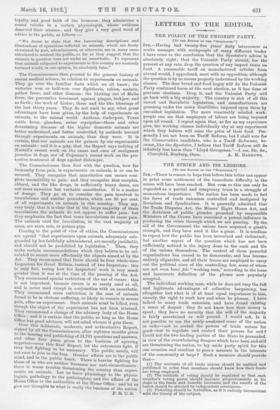THE STRIKE AND ITS LESSONS.
pro THZ EDITOR OF TRH "SPECTATOR."] Sig,—There is reason to hope that before this letter can appear in print some settlement of the immediate difficulty in the mines will have been reached. But even so this can only be regarded as a partial and temporary truce in a struggle of momentous importance. The nation has been made to feel the force of trade unionism controlled and instigated by Socialism and Syndicalism. It is generally admitted that the Trade Disputes Act, the Miners' Eight Hours Act, and the doctrines of publics plunder preached by responsible Ministers of the Crown have exercised a potent influence in producing the crisis through which we are passing. By the aid of the Government the unions have acquired a giant's strength, and they have used it like a giant. It is needless to repeat how the public has been terrorized and victimized; but another aspect of the question which has not been sufficiently noticed is the injury done to the rank and file of the unions themselves. The control of these powerful organizations has ceased to be democratic, and has become entirely oligarchic, and all their forces are employed to carry out the political aims of the controlling few, some of whom are not even bon d fide "working men," according to the loose and inaccurate definition of the phrase now popularly accepted.
The individual working man, while he does not reap the full and legitimate advantages of collective bargaining, hums altogether lost what is of at least equal importance to him, namely, the right to work how and when he pleases. I have talked to many trade unionists, and have found existing a sense of despair : they do not know how their money is spent ; they have no security that the will of the majority is fairly ascertained or will prevail. I would ask, Is it not possible to use the newly awakened sense of the nation in order—not to curtail the powers of trade unions for good—but to regulate and control their powers for evil ? Could not the two leading parties of the State be persuaded, in view of the overwhelming dangers which have been and still are threatening the nation, to lay aside party spirit for this one occasion and combine to pass a measure in the interests of the community at large ? Such a measure should provide that— (1) The accounts of all trade unions should be audited and published in order that members should know how their funds are being employed. (2) The methods of voting should be regulated so that each member's voting power should increase proportionately as his stake in the funds and benefits increases, and the results of the ballot should be attested by independent scrutineers. (3) Picketing should be forbidden, as it is entirely inconsistent with the liberty of the subject.
(4) The funds of a union should be made liable to fine for Injury done by it, and, above all, for breach of agreement entered Into and ratified, say, by the Board of Trade.
(5) Incitement to violence, spoliation, or breach of agreement should be made liable to severe penalties.
All these provisions are in accordance with precedent and evdryday practice in regard to other societies, and there can be little doubt that their application to trade unions would confer a much-needed protection, not only on society at large, but on all bond fide members of the unions themselves. They would, in fact, tend to restore a democracy which has been perverted into an oligarchy. The one necessary condition is that both parties should agree in passing them. Is it Utopian to hope that this may be possible at a time like the present ? Such a measure would of course meet with resolute opposi- tion from some of the leading officials of the unions and their Socialist allies, but there must be many other members who would welcome such an enactment. They have seen hundreds of thousands of men and women thrown out of work owing to no dispute or wish of their own, and the funds of their unions seriously depleted in consequence of a quarrel in which they take no active part. Of course the provisions would have to be made applicable, rnuats 9nutandis, to associations of employers as well as of











































 Previous page
Previous page